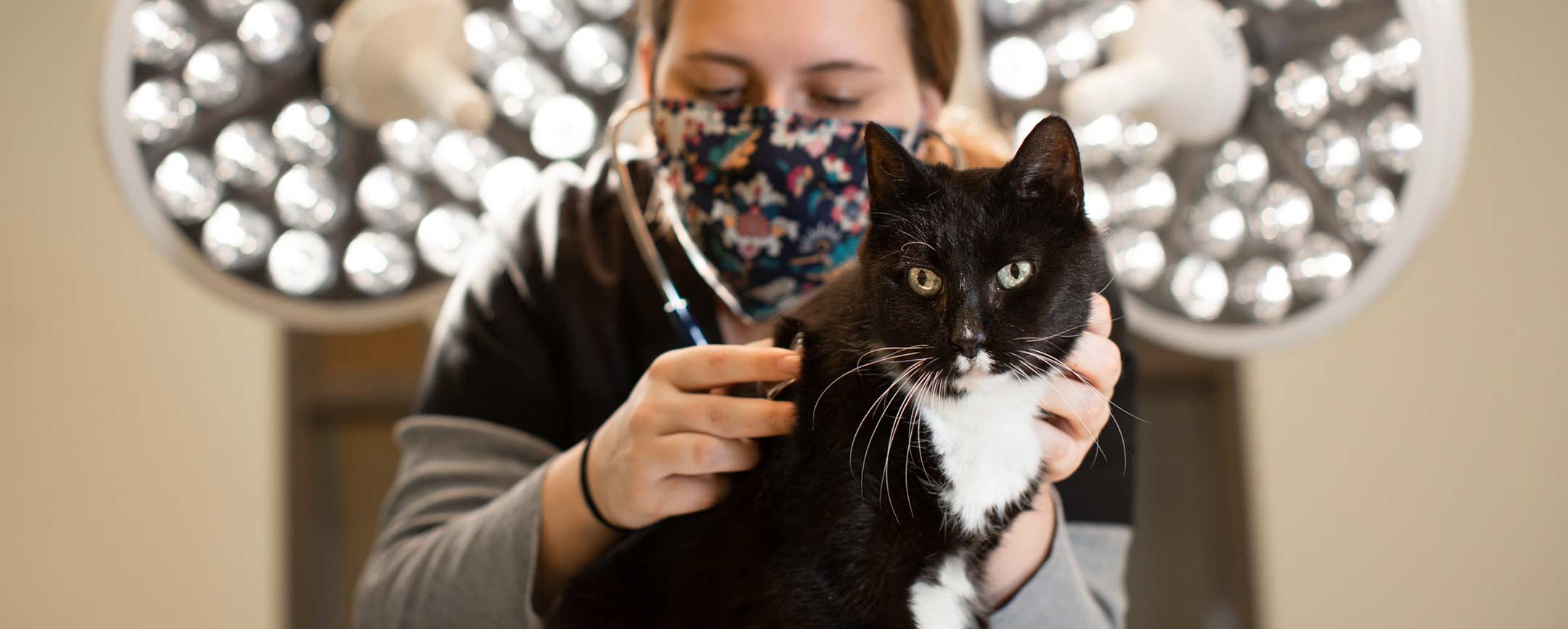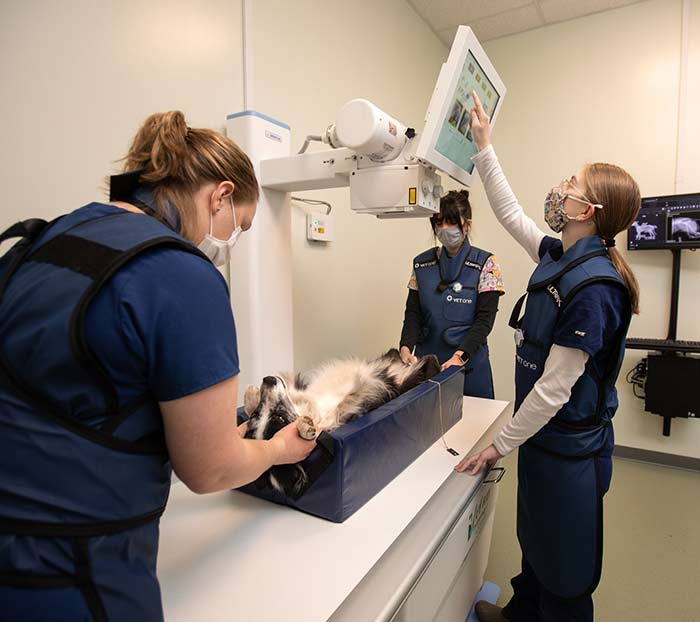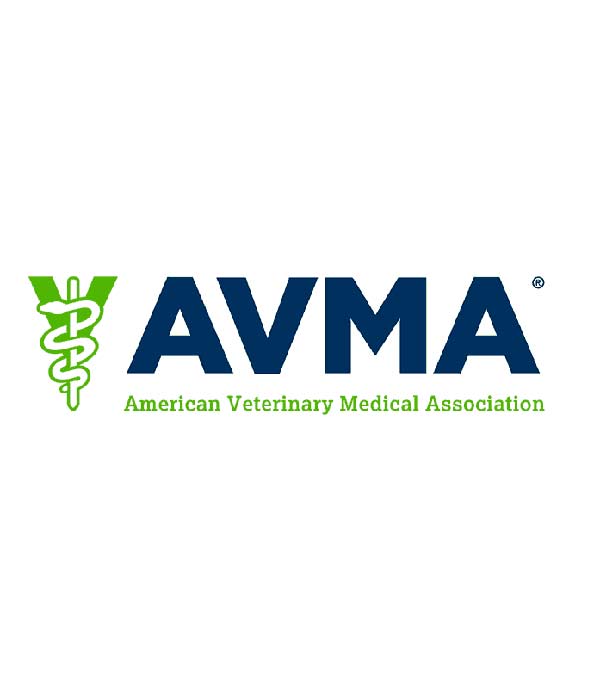
Veterinary Technology
Advance your career in animal care by earning an Associates or Bachelor’s degree in Veterinary Technology from PennWest University. You'll acquire practical skills and specialized training in small and large animal care, laboratory animal management, and shelter medicine. With PennWest's AVMA accreditation, you'll gain a solid foundation in animal anatomy, behavior, diseases, and clinical skills, preparing you for leadership roles.
The veterinary technician classes include animal anatomy, behavior and diseases, practice management, recordkeeping and laws pertaining to animal care, laboratory and clinical experiences. Along the way you will learn best practices for animal handling, as well as veterinary surgery, dentistry, radiology, pharmaceuticals, as well as anesthesia and pain management.
Expert faculty will supervise you as you work directly with small animals such as dogs, cats, rats and rabbits in high-tech, on-campus labs. Additional learning occurs in animal exam areas, a clinical laboratory equipped with diagnostic and imaging equipment and a surgical nursing suite. By selecting electives and additional clinical experiences in areas that interest you, you will be able to customize your education even further.
You’ll graduate ready to sit for the Veterinary Technician national exam and a rewarding career in settings that range from animal hospitals and humane societies to laboratories and research facilities. This BS in Veterinary Technology also qualifies for a job with veterinary practices and organizations such as the U.S. Department of Agriculture.
If you require a flexible learning schedule, you can opt for PennWest’s rigorous associate degree program, which is embedded within the bachelor’s in veterinary technology. This allows you to complete your Associate of Science requirement over two, three or four years.
This program is for you if...
- You are passionate about animal care and welfare.
- You enjoy hands-on work in clinical and laboratory settings.
- You are interested in gaining specialized training in small and large animal care, laboratory animal management, or shelter medicine.
- You aspire to work as a veterinary technician or in other animal health-related fields.
- You want to develop skills in diagnostic and therapeutic procedures, animal management, and veterinary technology.
-
64 Credits for AS
-
120 Credits for BS
What You'll Study
In the Veterinary Technology program at PennWest University, you'll study a comprehensive curriculum that includes animal anatomy, behavior, and diseases, as well as practice management, recordkeeping, and animal care laws. You'll gain hands-on experience through laboratory and clinical settings, focusing on veterinary surgery, dentistry, radiology, pharmaceuticals, anesthesia, and pain management. The program also emphasizes best practices in animal handling and includes elective courses to further customize your education, preparing you for various roles in animal health and veterinary services.

| Degrees, Certificates, Minors | Offered at... | |||
|---|---|---|---|---|
| California | Clarion | Edinboro | Global Online | |
| Veterinary Technology, AS | Program Offered At This LocationIn-Person | Program Not Offered At This Location | Program Not Offered At This Location | Program Not Offered At This Location |
| Veterinary Technology, BS | Program Offered At This LocationIn-Person | Program Not Offered At This Location | Program Not Offered At This Location | Program Not Offered At This Location |
Meet Our Faculty
Our faculty are not just instructors; they are mentors, researchers, and industry professionals committed to providing an education grounded in real-world experiences and academic excellence. From engaging classroom discussions to hands-on experiential learning, our educators are here to support and inspire you every step of the way.
Program Pass Rates - Aggregated for the Entire Program
| Year | Number of Students Taking the Exam | Pass Rate for 1st Time Test Takers |
|---|---|---|
| 7/1/2021 - 6/30/2023 | 15 | 53% (3 year) |
| 7/1/2023 - 6/30/2024 | 5 | 80% (1 year) |
| 1/1/2022 - 12/31/2024 | 31 | 39% (3 year) |
How You'll Learn
This program is offered in-person at our PennWest California campus. An in-person degree emphasizes traditional in-person courses.
What You'll Become
Career Paths
- Veterinary Technologists and Technicians
- Veterinary Assistants
Veterinary Technology Program Accredited
The designation comes from the Committee on Veterinary Technician Education and Activities of the American Veterinary Medical Association.

How We'll Help You Succeed
At Pennsylvania Western University, we prioritize your success and well-being from the moment you join our community. Our comprehensive student support system is designed to meet you where you are, offering personalized guidance, academic assistance, and emotional support to ensure you can fully focus on your studies and personal growth. Whether you're a first-generation college student, returning for further education, or navigating career changes, our dedicated faculty and staff provide the encouragement and resources you need to overcome challenges and thrive. With a wide range of services from tutoring and career counseling to mental health resources, PennWest stands by your side, empowering you to achieve your academic goals and prepare for a successful future. Join us at PennWest, where you're not just a student; you're part of a supportive family committed to helping you find your place in the world.
240
Number of hours of clinical experiences

The designation comes from the Committee on Veterinary Technician Education and Activities of the American Veterinary Medical Association. This program will remain on initial accreditation until achieving full accreditation. The full accreditation site visit is scheduled for 2026.
-
Affordable Programs
Tuition & FeesDiscover quality education that fits your budget with our affordable programs at PennWest.
-
Success Coaching
Success at PennWestAchieve your academic goals with personalized guidance from our dedicated student success coaches.
-
Post-Graduation Support
Life After PennWestWe're here for you even after graduation, providing support and resources to help you succeed in your career.

